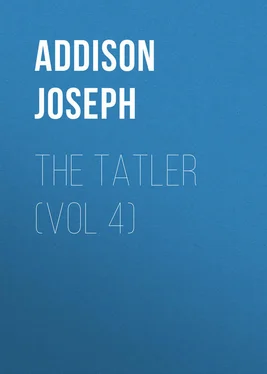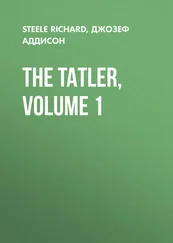Joseph Addison - The Tatler (Vol 4)
Здесь есть возможность читать онлайн «Joseph Addison - The Tatler (Vol 4)» — ознакомительный отрывок электронной книги совершенно бесплатно, а после прочтения отрывка купить полную версию. В некоторых случаях можно слушать аудио, скачать через торрент в формате fb2 и присутствует краткое содержание. Жанр: foreign_antique, foreign_prose, на английском языке. Описание произведения, (предисловие) а так же отзывы посетителей доступны на портале библиотеки ЛибКат.
- Название:The Tatler (Vol 4)
- Автор:
- Жанр:
- Год:неизвестен
- ISBN:нет данных
- Рейтинг книги:5 / 5. Голосов: 1
-
Избранное:Добавить в избранное
- Отзывы:
-
Ваша оценка:
- 100
- 1
- 2
- 3
- 4
- 5
The Tatler (Vol 4): краткое содержание, описание и аннотация
Предлагаем к чтению аннотацию, описание, краткое содержание или предисловие (зависит от того, что написал сам автор книги «The Tatler (Vol 4)»). Если вы не нашли необходимую информацию о книге — напишите в комментариях, мы постараемся отыскать её.
The Tatler (Vol 4) — читать онлайн ознакомительный отрывок
Ниже представлен текст книги, разбитый по страницам. Система сохранения места последней прочитанной страницы, позволяет с удобством читать онлайн бесплатно книгу «The Tatler (Vol 4)», без необходимости каждый раз заново искать на чём Вы остановились. Поставьте закладку, и сможете в любой момент перейти на страницу, на которой закончили чтение.
Интервал:
Закладка:
There is no man will allow him who wants courage to be called a soldier; but men who want good sense are very frequently not only allowed to be scholars, but esteemed for being such. At the same time it must be granted, that as courage is the natural part of a soldier, so is a good understanding of a scholar. Such little minds as these, whose productions are collected in the volume to which I have the honour to be patron, are the instruments for artful men to work with, and become popular with the unthinking part of mankind. In courts, they make transparent flatterers; in camps, ostentatious bullies; in colleges, unintelligible pedants; and their faculties are used accordingly by those who lead them.
When a man who wants judgment is admitted into the conversation of reasonable men, he shall remember such improper circumstances, and draw such groundless conclusions from their discourse, and that with such colour of sense, as would divide the best set of company that can be got together. It is just thus with a fool who has a familiarity with books, he shall quote and recite one author against another, in such a manner as shall puzzle the best understanding to refute him; though the most ordinary capacity may observe, that it is only ignorance which makes the intricacy. All the true use of that we call learning, is to ennoble and improve our natural faculties, and not to disguise our imperfections. It is therefore in vain for folly to attempt to conceal itself by the refuge of learned languages. Literature does but make a man more eminently the thing which nature made him; and Polyglottes, had he studied less than he has, and written only in his mother tongue, had been known only in Great Britain for a pedant.
Mr. Bickerstaff thanks Dorinda, and will both answer her letter, 12 12 No mention is afterwards made of Dorinda.
and take her advice.
No. 198. [Steele.
From Thursday, July 13 , to Saturday, July 15, 1710
Quale sit id quod amas celeri circumspice mente,
Et tua læsuro substrahe colla jugo.
13 13 This quotation is attributed erroneously to Horace in the early editions.
It is not necessary to look back into the first years of this young lady, whose story is of consequence only as her life has lately met with passages very uncommon. She is now in the twentieth year of her age, and owes a strict, but cheerful education, to the care of an aunt, to whom she was recommended by her dying father, whose decease was hastened by an inconsolable affliction for the loss of her mother. As Cælia is the offspring of the most generous passion that has been known in our age, she is adorned with as much beauty and grace as the most celebrated of her sex possess; but her domestic life, moderate fortune, and religious education gave her but little opportunity, and less inclination, to be admired in public assemblies. Her abode has been for some years a convenient distance from the Cathedral of St. Paul's, where her aunt and she chose to reside, for the advantage of that rapturous way of devotion which gives ecstasy to the pleasures of innocence, and, in some measure, is the immediate possession of those heavenly enjoyments for which they are addressed.
As you may trace the usual thoughts of men in their countenances, there appeared in the face of Cælia a cheerfulness, the constant companion of unaffected virtue, and a gladness, which is as inseparable from true piety. Her every look and motion spoke the peaceful, mild, resigning, humble inhabitant that animated her beauteous body. Her air discovered her body a mere machine of her mind, and not that her thoughts were employed in studying graces and attractions for her person. Such was Cælia when she was first seen by Palamede at her usual place of worship. Palamede is a young man of two-and-twenty, well-fashioned, learned, genteel, and discreet, and son and heir of a gentleman of a very great estate, and himself possessed of a plentiful one by the gift of an uncle. He became enamoured with Cælia, and after having learned her habitation, had address enough to communicate his passion and circumstances with such an air of good sense and integrity, as soon obtained permission to visit and profess his inclinations towards her. Palamede's present fortune and future expectations were no way prejudicial to his addresses; but after the lovers had passed some time in the agreeable entertainments of a successful courtship, Cælia one day took occasion to interrupt Palamede in the midst of a very pleasing discourse of the happiness he promised himself in so accomplished a companion, and assuming a serious air, told him, there was another heart to be won before he gained hers, which was that of his father. Palamede seemed much disturbed at the overture, and lamented to her, that his father was one of those too provident parents, who only place their thoughts upon bringing riches into their families by marriages, and are wholly insensible of all other considerations. But the strictness of Cælia's rules of life made her insist upon this demand; and the son, at a proper hour, communicated to his father the circumstances of his love, and the merit of the object. The next day the father made her a visit. The beauty of her person, the fame of her virtue, and a certain irresistible charm in her whole behaviour on so tender and delicate an occasion, wrought so much upon him, in spite of all prepossessions, that he hastened the marriage with an impatience equal to that of his son. Their nuptials were celebrated with a privacy suitable to the character and modesty of Cælia, and from that day, till a fatal one of last week, they lived together with all the joy and happiness which attend minds entirely united.
It should have been intimated, that Palamede is a student of the Temple, and usually retired thither early in a morning, Cælia still sleeping.
It happened a few days since, that she followed him thither to communicate to him something she had omitted in her redundant fondness to speak of the evening before. When she came to his apartment, the servant there told her, she was coming with a letter to her. While Cælia in an inner room was reading an apology from her husband, that he had been suddenly taken by some of his acquaintance to dine at Brentford, but that he should return in the evening, a country girl, decently clad, asked, if those were not the chambers of Mr. Palamede? She was answered, they were, but that he was not in town. The stranger asked, when he was expected at home? The servant replied, she would go in and ask his wife. The young woman repeated the word "wife," and fainted. This accident raised no less curiosity than amazement in Cælia, who caused her to be removed into the inner room. Upon proper applications to revive her, the unhappy young creature returned to herself, and said to Cælia, with an earnest and beseeching tone, "Are you really Mr. Palamede's wife?" Cælia replies, "I hope I do not look as if I were any other in the condition you see me." The stranger answers, "No, madam, he is my husband." At the same instant she threw a bundle of letters into Cælia's lap, which confirmed the truth of what she asserted. Their mutual innocence and sorrow made them look at each other as partners in distress, rather than rivals in love. The superiority of Cælia's understanding and genius gave her an authority to examine into this adventure as if she had been offended against, and the other the delinquent. The stranger spoke in the following manner:
"Madam, if it shall please you, Mr. Palamede having an uncle of a good estate near Winchester, was bred at the school there, to gain the more his good-will by being in his sight. His uncle died, and left him the estate, which my husband now has. When he was a mere youth he set his affections on me: but when he could not gain his ends he married me, making me and my mother, who is a farmer's widow, swear we would never tell it upon any account whatsoever; for that it would not look well for him to marry such a one as me; besides, that his father would cut him off of the estate. I was glad to have him in an honest way, and he now and then came and stayed a night and away at our house. But very lately he came down to see us, with a fine young gentleman his friend, who stayed behind there with us, pretending to like the place for the summer; but ever since Master Palamede went, he has attempted to abuse me; and I ran hither to acquaint him with it, and avoid the wicked intentions of his false friend."
Читать дальшеИнтервал:
Закладка:
Похожие книги на «The Tatler (Vol 4)»
Представляем Вашему вниманию похожие книги на «The Tatler (Vol 4)» списком для выбора. Мы отобрали схожую по названию и смыслу литературу в надежде предоставить читателям больше вариантов отыскать новые, интересные, ещё непрочитанные произведения.
Обсуждение, отзывы о книге «The Tatler (Vol 4)» и просто собственные мнения читателей. Оставьте ваши комментарии, напишите, что Вы думаете о произведении, его смысле или главных героях. Укажите что конкретно понравилось, а что нет, и почему Вы так считаете.












